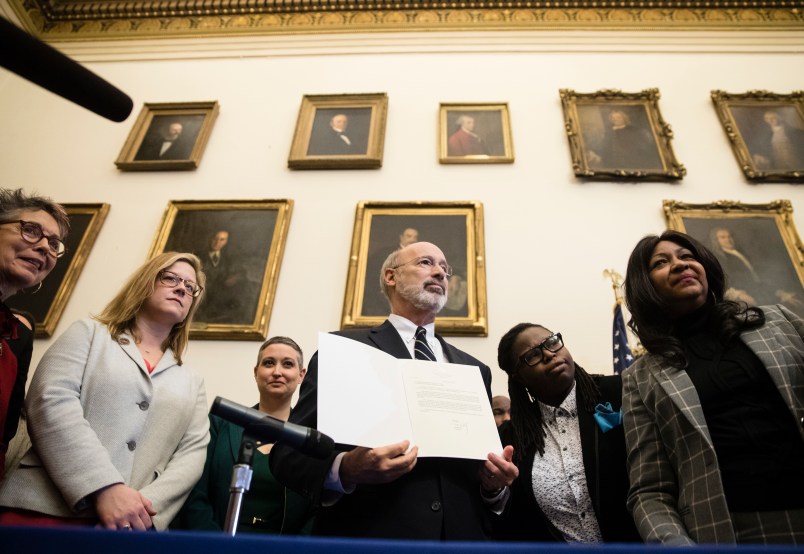HARRISBURG, Pa. (AP) — Democratic Gov. Tom Wolf on Monday vetoed a bill passed by the Republican-controlled Legislature that would have limited abortions to the first 20 weeks of pregnancy.
Wolf, who supports abortion rights, rejected what Planned Parenthood said would have been the nation’s most restrictive abortion law. He signed the veto paperwork in a public ceremony in Philadelphia City Hall, calling the bill “a disingenuous and bald-faced attempt to create the most extreme anti-choice legislation in the country.”
Pennsylvania’s current limit is 24 weeks. The 20-week limit would have kept in place exceptions under current law for when a mother’s life or well-being is at risk, but it had no exceptions for rape, incest or fetal abnormalities.
The bill’s sponsor, state Sen. Michele Brooks, R-Crawford, said a baby can survive outside the womb at 20 weeks gestation, thanks to advances in technology, and laws must catch up.
Brooks was disappointed, she said, that the state “will be unable to protect so many babies in the future, who will never know the joy of living.”
Statistics published by the state Department of Health show there were 380 abortions done after week 20 in 2015, the latest year for which data is available. There were 31,818 abortions in total that year in Pennsylvania.
The bill also would have effectively banned dilation-and-evacuation, the most common method of second-trimester abortion, opponents said. Brooks contended that the bill does not ban the procedure, but rather, the fetus must first be injected by saline to cause its death.
According to the American Congress of Obstetricians and Gynecologists, there is no evidence that inducing fetal death makes second-trimester abortions safer, and opponents question whether such an injection makes it less safe for the mother.
The bill was opposed by the Pennsylvania Medical Society and the Pennsylvania section of the American Congress of Obstetricians and Gynecologists.







Thank you, GovinPA.
The old saw: PA is Pittsburgh and Philadelphia with Alabama [insert favorite Pennsyltucky state here] in between.
Last I heard, the gerrymandered Legislature did not have enough votes for an override of the Govna’s veto.
We’re working hard on the gerrymandering part. Meantime, thank God for Gov. Wolf.
How about we pass a law that says that ignorant Bible-thumpers have NO input on medical matters which should be determined between a physician and his/her patient?
I received a diagnosis of an unsurvivable fetal anomaly when I was 21 weeks pregnant. You cannot fathom how much I hate these people.